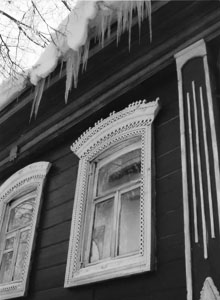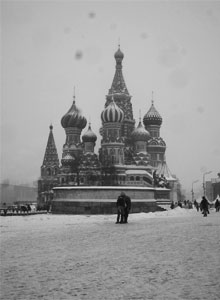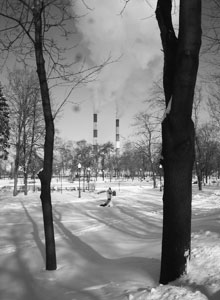
A winter’s tale: Snow in Moscow
A winter’s tale
What the snows of Moscow reveal about modern Russia
The Economist | February 16th 2006 | MOSCOW
ON THE wall of Andrei Pentukhov’s office is a large map of Moscow. Black marks are scattered across it, clustering especially around the railway stations to the north-east of the city centre. Each black spot represents a person found dead of hypothermia in the streets. Mr Pentukhov, who works for the municipal social-services department, explains that hypothermic corpses turn up even in August, after drunks tumble into puddles. Most of the black spots, however, appear on the map during the winter. Muscovites have a name for the bodies that emerge when the snow thaws; they call them “snowdrops”.

“The dark sky merged with a sea of snow,” wrote Pushkin in “The Captain’s Daughter”; “in one second…everything disappeared.” Today, the winter snows of Moscow cover many of the city’s flaws: the glum architecture, and the grime and clutter of its breakneck growth. But the winter and the snow also reveal other, hidden aspects of modern Russia: the superpower status it still retains among its neighbours; the desperation that lurks beneath the oil-fuelled glitz; the brutality, lawlessness and all-permeating corruption.
Consider the wintry lives of two sometimes invisible communities: the homeless, and the army of migrant workers from Russia’s ex-Soviet neighbours which has descended upon its capital. Less eye-catching than terrorists and tycoons, they are just as telling about the country they live—and die—in.
The problems and peculiarities of Moscow’s homeless reflect Russia’s dramatic recent history. First, their sheer numbers, which, like many of Russia’s problems, are as outsized as the country itself. Those numbers have declined since the early 1990s, but even conservative estimates say there are still 10,000 souls sleeping on the city’s streets or in temporary digs; some put the figure many times higher. Just as striking is the paucity of public provision for them. Peter the Great decreed that vagrants should be beaten and exiled to Siberia; in Soviet times, homelessness was, in effect, illegal. Today, the city provides around 1,500 hostel beds, says Mr Pentukhov, who insists that no one is turned away in winter. Others are sceptical.
The special causes of Moscow’s homelessness are telling, too. As in other countries, many rough-sleepers are ex-convicts. But others are victims of the economic turmoil of the 1990s—first the chaos and hyperinflation that followed the Soviet Union’s disintegration, then the default and devaluation of 1998. Some traded their apartments for vodka, or were swindled out of them and have slept rough since.
Between swigs of beer outside a railway station, Naina claims that the mafia and the FSB (successor to the KGB) conspired to take her home away. “Granny Tanya”, as she is known among her peers, is a toothless old woman in a pitifully thin coat, with signs of a recent beating on her face. Her days are spent in an underpass near the ministry of foreign affairs. She knows where the traffic lights change most slowly, giving her most time to beg from idling cars. She lived in Central Asia for most of her life; returning to Russia in 1990, she found it had no place for her. Before the heavy snows came she slept on top of some hot-water pipes at the back of an apartment block.

In winter, Moscow’s homeless sleep in the stairwells of residential buildings, ringing on all the buzzers until someone inadvertently lets them in, then pretending to be asleep when residents pass by. Or they crawl into the ventilation shafts of the city heating system. It is too cold to walk around all night and sleep in the Metro during the day as they do in the summer; but some ride suburban trains to outlying towns where the entryways to apartment buildings are unlocked. Or, as Granny Tanya has often done, they bed down in one of Moscow’s stations. The homeless adults share these with another group that is symptomatic of Russia’s post-Soviet condition: Moscow’s street children, products of the widespread family breakdown that the collapse of the Soviet empire and the end of communism brought with them.
In 2002, Vladimir Putin, Russia’s president, declared that the problem of child homelessness in Russia had reached “threatening proportions”. The nation’s runaways then numbered in the millions. New shelters were opened, and the police were given powers to pick up homeless youngsters. Yet last year the interior minister declared that Russia was living through a new wave of child homelessness, comparable to those induced by the civil war and the second world war.
One of its casualties is Dasha, a girl who says she is 17 but looks younger, androgynous and drug-addled. She spends her days sniffing glue and floor lacquer at Kursky railway station, paid for by begging. (Outside restaurants in the evening is best, she says, but “There are not many kind people” in Moscow.) The gang of kids who sniff drugs, explains Dasha, fights with the gang that injects instead; Dasha has a scar on the bridge of her nose from a brawl with a girl who, she claims, stole 65 roubles ($2.30) from her. She and other Moscow youngsters get some help from Médecins Sans Frontières (MSF), a charity that runs a street-children project in the city. On most evenings, Dasha takes the train to suburban Podolsk, and sleeps in the entryway of an apartment building. What does she think will happen to her in the future? “There is nothing to think about.”
There are perils besides the drugs and the rival gangs, especially during the winter. Like some handicapped people, homeless children are forced by criminals to beg or steal, says Alexei Nikiforov of MSF. But the biggest problem is the police and their brutality. And the hardest time is the middle of the night, when the station administrators are away and the policemen get drunk.
In Kursky station, the children nickname the worst of them “Horse-head”. Despite a government decree that stations should accommodate the homeless during the recent Arctic cold snap, Horse-head drives them out of the warm places, says Dasha, and attacks them. The police, adds the city’s Mr Pentukhov with some understatement, “are not an organisation you can turn to for help.””They beat us with sticks and tell us to go outside,” says Kadzhi, a homeless man who also sleeps in the station, “but how can we? We’d die out there.” In the summer—and if all else fails, in winter too—the Kursky kids have found a frigid fetid cavity beneath a railway platform, with an earth floor and littered with filthy blankets.
As is the case with homeless people in other countries, only more so, lack of a fixed address and of proper identity documents makes escaping the streets of Moscow difficult. “With a document you are a man,” ran an old Soviet saying; “without one, you are nothing.” This extra-legal status also blights the Moscow life of another, overlapping and even larger shadow community: another one visible, if you look closely, against the white of the snow.
Strange fruit
Moscow is not, in general, a city that works. The two conspicuous exceptions are the Metro and the central heating. Less obvious, but also formidable, is the vast snow-shifting industry that keeps the city at least semi-functioning for (roughly) five snow-bound months each year.
It snows, on average, 50 times a year in Moscow. Two metres of the stuff fell last winter. Faced with foreign invaders, the winter and the snow have been one of Russia’s most important assets; in peace-time, they are a massive economic burden. In Moscow, the enterprise of scraping the snow off the streets and pavements, forming it into snow hillocks, carting it off in 6,000-odd snow vehicles for dumping or melting, and finally zapping it with chemicals to speed the thaw is vast and costly (which helps to explain why Yuri Luzhkov, the city’s mayor, threatened last year to fine meteorologists who make wrong forecasts). The motor of this enterprise is a legion of migrant workers, mainly from the Caucasus and Central Asia.

Snow is the city’s winter crop, the season’s main chance for men such as Marat and Mukhtar from Kirgizstan, who clear it from courtyards and side streets in central Moscow. (The pavement outside Mr Luzhkov’s nearby office is defrosted by underground heating.) Marat has three children at home; both men earn 7,000 roubles a month, much more than they could hope for in Kirgizstan. The city, they say, pays its street staff 1,000 roubles more in the snowy months to compensate for the back-breaking nocturnal clean-ups. Mukhtar and Marat say they live on around 2,500 roubles and send the rest home. Even at minus 25°C, they say, the work is too hard for them to get cold.
Mukhtar and Marat are lucky, because their snow labour is legal. The city authorities arrange the two things they need to work in Moscow officially: a work permit and their residential registration (though money is deducted from their salaries to pay for the paperwork). From tsarist times, living in Moscow has been a privilege rather than a right, even for Russians. After three days in the city, all foreign newcomers must register their addresses with the authorities. In theory, explains Svetlana Gannushkina of Migration Rights, which provides legal support to immigrants, registering should be easy; in practice, it requires the goodwill of landlords, the co-operation of the police and, frequently, bribes. Getting a work permit, which the employers themselves must do, is also costly and complicated.
Last year, according to the federal migration service, 750,000 work permits were issued for foreigners to work in Russia. But 10m-14m people, the service reckons, are in the country illegally. The vast majority come from Russia’s ex-Soviet neighbours, where living standards fell further and faster when the Soviet economy disintegrated than in Russia itself. In the West, Russia is seen as a middle-income country with important raw materials and a few extravagant oligarchs; in Central Asia and the Caucasus, it is considered the land of opportunity. Tajikistan, torn by war and narco-trafficking and the very poorest of the ex-Soviet republics, is thought to derive around 20% of its GDP from remittances. Every third household in Moldova is said to have a family member working in Russia. Around 3m of these illegals are believed to be scratching a living in the capital.
Like many economic migrants around the world, those who make for Moscow tend to be aspirational and moderately well-educated, but see their social status dip when they arrive as they take up jobs that native Muscovites balk at. When Boris first came to Moscow from Tajikistan, for example, he wanted to go to medical school. But he says he couldn’t afford the bribe that was needed to stay in education. So he ended up working illegally on a construction site run by a Turkish company and living in an on-site barracks. Many others like him live in subterranean digs under Moscow’s markets, or in boiler and storage rooms, jerry-rigging electric heaters when the temperature falls. Nine Tajiks, said to have been living in a caravan, died in a fire in the Moscow region last week. When the Turks didn’t pay him for three months, Boris says, he left.

Refusal to pay salaries is a common scam on the construction sites that soak up much of the immigrant influx during the spring and summer. Muhammad Islamov came to Moscow from Uzbekistan, looking, he says, for political asylum. For six years he has been living in barracks. Last winter, he worked clearing away the snow for a group of dachas outside the city: “heavy work”, Mr Islamov says. Then last summer, he and five other men worked for three months building a dacha. They were given enough food, he says, to stop them dying of hunger, but were paid “not a kopek”. When the work was done, he says, all six of them were arrested and beaten by riot police, who, he believes were in league with the contractor. Mr Islamov has a minutely itemised account of his unremunerated work, scale drawings of the dacha, and a hospital report about the damage to his ribs from the alleged beating, plus copies of his fruitless correspondence with local prosecutors about the swindle.
But he is better off than some. The trouble, says Gauhar Dzhuraeva of the Tajikistan Foundation, a group which helps immigrants in difficulty, is that if a worker is not properly registered, “after three days you can do what you want with him.” Without the proper documents, immigrants are liable to deportation if stopped by the police. And they are likely to be stopped: a monitoring project by a human-rights organisation, borrowing its methodology from racial-profiling research in America, found that Central Asian and Caucasian immigrants are 21 times more likely to be questioned by the police in metro stations than are Slavs.
As a result, many are confined to modern-day urban gulags. Passports are often confiscated by employers; sexual slavery and the sale of human beings are not uncommon. Even a work permit offers limited protection: since it is non-transferable, it makes a worker wholly dependent on his employer, a relationship that many abuse. When he met The Economist, Mr Islamov was raising money for a friend from Tajikistan who had been forced to dig a trench on the coldest day of January. His frostbitten feet needed surgery afterwards.
Cold comforts
Some in Russia, including in the federal migration service, want to do something about this system, or the lack of one—for Russia’s benefit, if not for the migrants themselves. Russia has the demography of a country at war: its population is shrinking at the rate of around 750,000 people a year. Only managed immigration can fill its medium-term need for able-bodied adults. The migration service has been experimenting with the “legalisation” of migrants in pilot regions across Russia. It is lobbying for a comprehensive government scheme to bring people in, and for a simplified registration system.
Unfortunately, as Elena Tyuryukanova, an expert on migration at the Russian Academy of Sciences, delicately puts it, the interests of the state, and of particular individuals who represent it, are not aligned. In other words, the current shambles may simply be too profitable to scrap.
A deported migrant cannot return to Russia for five years. This makes the threat of deportation an extremely lucrative one for the police to wield. Even if a foreigner’s registration documents are real, says Mr Islamov the Uzbek, policemen are liable to seize them and demand a bribe: “These are our rights,” he says ironically. Fitting migrants up on drugs charges—or threatening to—is another earner. Many migrant workers, it is said, have taken to sewing up small amounts of money in their coats, to have something left over after they are frisked. Ms Dzhuraeva says that 70% of the problems she deals with involve the police. They are sometimes darker than mere extortion. According to her organisation, one Sadri Beknazarov set off at the beginning of the winter to wire $700, saved from his job on a construction site, back to Tajikistan at a bank. Policemen intercepted him; he hasn’t been seen since. The police refuse to comment.

There are other predators. Ms Tyuryukanova says that the complexion of the immigrant community is changing, as the proportion that comes from Central Asia rises and the quotient from Slavic Ukraine falls. Thus the “cultural distance” between the mass of newcomers and the host community is widening. At the time of the riots in France last year, Russian commentators voiced anxieties about the growing, unintegrated foreign communities living in the capital. But in truth the risk of insurrection by Moscow’s unorganised, beleaguered Uzbeks and Tajiks seems slim.
Conversely, their chances of suffering violence are rising. The Tajikistan Foundation has a horrific video of Russian yobs beating a Tajik man to death in a Moscow school-yard early in the winter. Skinhead violence is booming in Russia, a vicious corollary of the increasingly strident nationalism of mainstream politics. A number of foreign students have been murdered in St Petersburg; a man from Mali was killed there two weeks ago.
Other migrants meet less dramatic ends on the snowy streets of Moscow. Nearly half its homeless have come to the city from outside Russia—especially, says Mr Pentukhov, the social-services manager, from Tajikistan and Ukraine. They come looking for work, then run out of money and can’t get home. Some finish up among the “snowdrops” of the thaw. And work itself can be perilous, especially in the winter, when workers clamber across roofs clearing the snow and scraping off icicles, often without safety harnesses.
Last year, a British woman living in Moscow found a Tajik man lying on his back in the street in a plush central neighbourhood. He had fallen four storeys from the roof he had been clearing. He was still alive, she thinks, when the police happened on the scene, but they only looked at him, smoked a cigarette and drove off. For 40 minutes, she estimates, until an ambulance took him away, he lay on his back in the street, his blood seeping into the snow.
Category: 2 - Russia